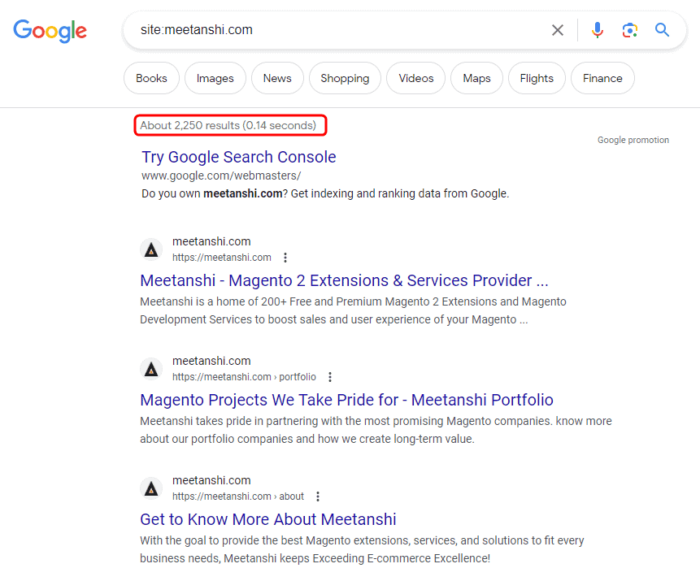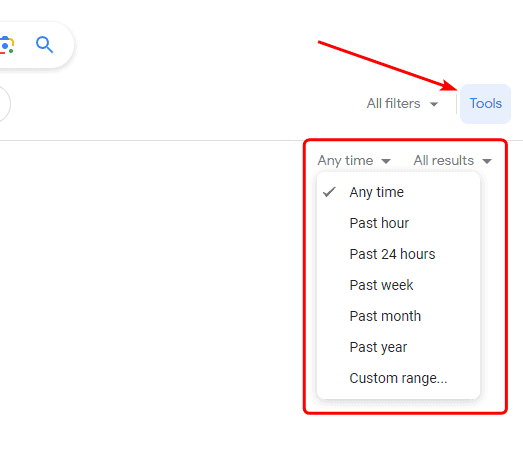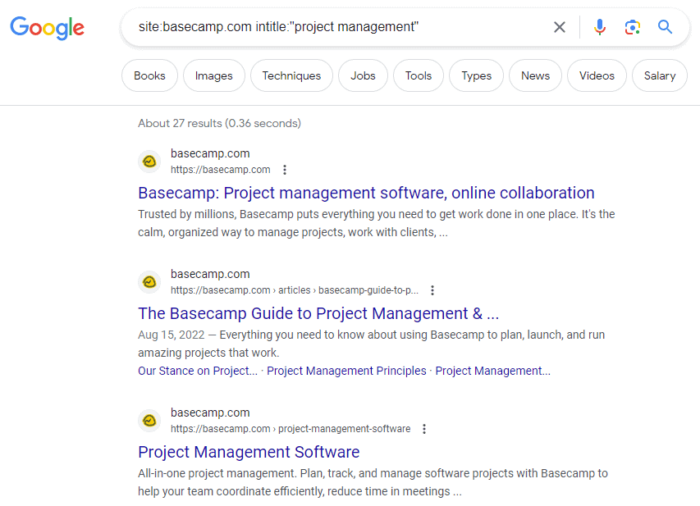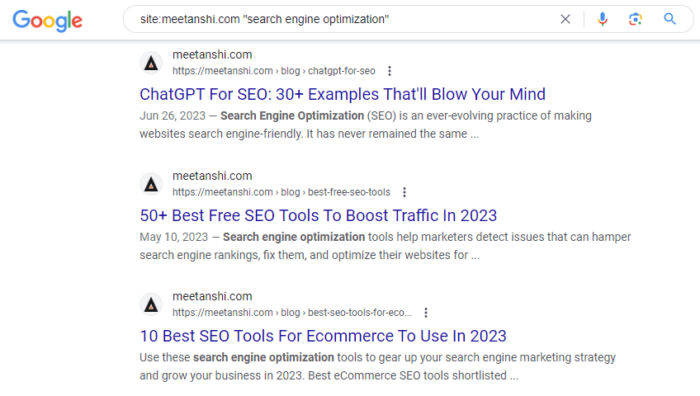Google Search Operators for SEO & Tips to Use Them – 2024

In Hurry? Download the PDF Version!
Get the complete list of Google Search Operators in a PDF Format. Direct Download Available!
Google search operators help you find more specific results. Advanced search techniques can add more power to your online research.
In this post, you’ll get a Google Search Operators list.
You’ll also learn to use the Google Search Operators for SEO.
Important Topics
- What are Google Search Operators?
- List of Google Search Operators
- How to Effectively Use Google Search Operators?
- 8 Ways to Use Google Search Operators for SEO
What are Google Search Operators?
Google Search Operators are special queries or symbols for making more refined searches.
These special queries help you find more precise results.
For example, let’s say you want search results from only Meetanshi.com, you can use the site: operator.

Like this there are many Google search operators you can use. Many of them have practical applications for SEO.
Google has been supporting advanced search operators for a long time now. Some of them are even deprecated now and may not work as expected.
The deprecated search operators have been listed separately for your convenience!
List of Google Search Operators (100% Working)
Here’s the complete list of Google Search Operators you can use to refine your search.
They’re tested & 100% working.
“”
Search for the exact-match phrases or words.
Example: “Apple”
This will show all the results containing the Apple word.
OR
Search for results matching one of the two terms. Sometimes, results may also contain both terms.
Example: Apple OR Google
Google will display all results containing matching Apple or Google.
|
It is an alternative to the OR operator.
Example: Apple | Google
AND
Search for results matching both terms.
Example: Apple AND Google
This will show results relevant to both Apple and Google.
-
Exclude pages that do not contain specific terms or match the condition.
Example: Apple -iPhone
This will show pages that are related to Apple but not iPhone.
*
Wildcard character for Google search. It fills in a missing word or phrase.
Example: best * in San Diego
Display results containing any phrase in place of the wildcard.
()
Group multiple search terms or operators for desired results.
Example: Apple (iPhone OR iPad)
Show results relevant to Apple iPhone or Apple iPad.
define:
Display definitions of terms through Google dictionary, knowledge panel or relevant results.
Example: define:search engine optimization
Google will display the definition of SEO along with relevant results.
cache:
Get the cached version of the web page from Google.
Example: cache:https://meetanshi.com
This will return the latest checked copy of the Meetanshi homepage.
filetype:
Search for specific types of files (pdf, doc, etc.)
Example: Google Search Operators filetype:pdf
Returns all Pdf results related to Google search operators.
ext:
Alternative to the filetype: operator.
Example: Google Search Operators ext:pdf
site:
Find results only from a specific website.
Example: site:meetanshi.com SEO
This returns results related to SEO only from Meetanshi.
related:
Find websites similar to a specific domain. It may not work for all domains.
Example: related:google.com
This will display other sites that are similar to Google.
intitle:
Find results with a specific term in the title tag.
Example: intitle:checklist seo
Shows all the results related to SEO, containing the “checklist” word in the title tag.
allintitle:
Find results with a specific phrase in the title tag.
Example: allintitle:seo checklist
Shows all the results containing both SEO & Checklist words in the title tag.
inurl:
Find results containing a specific term in the address.
Example: inurl:seo-checklist
Returns results containing “seo-checklist” in the address.
allinurl:
Find results containing all the terms in the address.
Example: allinurl:wordpress seo checklist
Returns results containing all three words – wordpress, seo, and checklist in the address.
intext:
Find results containing specific terms anywhere in the content.
Example: intext:backlinks
Returns results containing the word backlinks anywhere in the content.
allintext:
Find results containing all the terms anywhere in the content.
Example: allintext:seo checklist
Returns results containing both SEO and checklist, both words anywhere in the content.
weather:
Find weather information of any location by name or pin code.
Example: weather:San Diego
stocks:
Search for stock information by ticker or stock name.
Example: stocks:tesla
Displays Tesla stock information from Google finance.
after:
Display results after a specific date. (Enter date in yyyy-mm-dd format.)
Example: after:2023-07-01 seo checklist
Returns results related to SEO checklist that were published or refreshed after July 1, 2023.
before:
Displays results before a specific date. (Enter date in yyyy-mm-dd format.)
Example: before:2023-07-01 seo checklist
Returns results related to SEO checklist that were published or refreshed before July 1, 2023.
in
Convert currencies, measurement units, time zones, etc.
Example: 1000 USD in Euro
Returns the currency conversion from USD to Euro using real-time data.
Unreliable Google Search Operators (May Not Always Work)
These are some Google search operators that you can use, but not totally rely on:
#..#
Displays results matching the number between the ranges.
Example: old laptops $200..$300
inanchor:
Search for pages having the term in the anchor text of the links.
Example: inanchor:marketing
allinanchor:
Search for pages having all the terms in the anchor texts of links.
Example: allinanchor:inbound marketing
AROUND(#)
Search for pages containing both terms within a close distance of # words.
Example: whatsapp AROUND(3) marketing
Discontinued Google Search Operators (Not Working)
Google dropped some of the search operators, which no longer work as expected all the time. Here are the deprecated Google search operators:
~
Finds results matching the synonyms of the term.
Example: ~best seo chrome extensions
+
Find results containing an exact-match term. (Used to work similar to the “” operator, but only for a single term.)
Example: apple +iPhone
inpostauthor:
Used to search results in the Google blog (deprecated) by author name.
Example: inpostauthor:Neil
allinpostauthor:
Search Google blog results containing all the terms in the author name.
Example: inpostauthor:Neil Patel
inposttitle:
Search results from Google blog with titles containing a specified term. Now works similar to the intitle.
Example: inposttitle:seo
link:
Find web pages linking to a specific page. In other words, find backlinks.
Example: link:example.com
info:
Find information related to a page or a website.
Example: info:meetanshi.com
id:
Similar to info:.
Example: id:meetanshi.com
phonebook:
Find phone number by name.
Example: phonebook:steve harvey
#
Search by hashtags on Google+.
Example: #india
How to Effectively Use Google Search Operators?
Here are some helpful tips for using Google Search Operators to get more refined results.
Do not put spaces between the operator and term
Use the Google search operators, as described above.
It may not work as expected if you add any extra space or symbol.
For example, avoid site : meetanshi.com or site: meetanshi.com.
Combine multiple search operators to get the desired results
You can use multiple search operators in a single query to get desired results.
Use the parentheses to group the operators.
Examples:
- Find Pdf files from Google.com website – site:google.com filetype:pdf
- Get blog posts with SEO in title from Meetanshi.com – site:meetanshi.com/blog intitle:seo
Keep the allin… operator always at the end of the query
One thing to understand when using allinurl, allintitle, or allintext operators is that they consider all the succeeding terms.
8 Ways to Use Google Search Operators for SEO
Listed below are eight ways to use Google search operators for SEO:
Find Indexing Issues
The site: operator finds all the indexed pages of any domain.
This can be useful for SEOs to determine the website size.
You can also use this to check if any unnecessary pages are indexed.

This also works for specific web pages.
You can check the indexing status of a web page by simply putting its address after the site: operator.

That’s really helpful when you quickly want to know if a specific page is indexed by Google or not.
You can take this analysis to a further level by using the Tools option on Google search.
Use it to find pages that were indexed recently by selecting the appropriate time range.

Or manually use the before: after: operators to find results from a specific time range. 🙂
Quick Tip: Use site:yourwebsite.com intitle:prev_year to find old pages that need an update!
Find & Analyze Competitors
The related: command can help you find competing domains.
It may not work for everyone but it is surely worth the try.

Further, you can use other Google search operators to analyze a specific competitor.
For example, you can quickly find content related to a specific topic by using a combination of operators.

Find Guest Post Opportunities
Google search commands can be pretty useful to find some really good sites accepting guest posts in your niche.
Try combining your keyword with terms, such as “write for us”, to find sites for guest posting.

Similarly, you can try other terms to find sites accepting guest posts. Some of the terms are listed below:
- topic “become a contributor”
- topic “become a guest writer”
- topic “contribute guest posts”
- topic “guest article”
- topic “guest author”
- topic “guest post written by”
- topic “our editorial guidelines”
- topic “our guest post guidelines”
- topic “submit an article”
- topic “we are accepting guest articles”
- topic “write an article for us”
- topic “write for us”
You can also experiment using intitle or inurl operators to find a specific guest post page.
Similarly, you can find sites accepting sponsored posts.
Find Duplicate Content Issues
The double quotation marks “” can be useful to find exact matches of phrases or sentences on Google. This can help you track down both cross-site and onsite content duplication issues.
Search for a sentence or phrase inside double quotation marks to find results.
If you specifically want to look for duplicate content on other sites, exclude your domain by using -site:.

This can be pretty useful to find sites stealing your content. Now, send a DMCA notice to those crooks!
Find Unlinked Brand Mentions
Many people talk about your brand without linking to it. Approaching them and asking for a link can help you earn pretty good backlinks.
You can use “” and -site: operators to find brand mentions excluding your site.
For example, “your brand name” -site:yourbrandname.com will return all the pages on other sites mentioning your brand.
You can filter these mentions by time using the Tools option on the left side of the search results.
This also works for names for people with personal branding.
Find Listicles in Your Niche
Let’s say you’re a marketing company.
Now, you may want your site to appear on listicles, such as best marketing companies.
You can take help from Google search commands to find such listicles and approach them.
For example, intitle:“best marketing companies” will display all the listicles with the provided title.

Now, outreach the websites to include your business name and get noticed!
Find Non-Secure Pages
Https is a confirmed Google ranking factor.
Your site needs to have an SSL certificate and serve content over https. It also creates a bad user experience as most browsers show an alert sign for unsecure pages.

Google search operators can help you find any non-secure http page that is indexed, in case.
For example, try site:yourwebsite.com -inurl:https
Find Opportunities for Internal Links
You can also use Google search commands for internal links.
Use the double quotation marks and site: operator to find exact-match results from your site.

You can also find pages with specific titles by using intitle operator.
In addition to these tips, there are several other ways you can use Google Search Operators for SEO. Try and experiment with different combinations of search operators to refine the search for SEO.
Master the Google Search Operators for SEO
There are more than 35 Google search operators you need to know. Some of them are deprecated, while others work perfectly fine.
Use the search operators to perform advanced Google searches for SEO.
Continue your SEO learning with these articles:
- Guide to Google Rich Snippets for SEO
- Bing Search Algorithm: Top Ranking Factors
- Google’s Featured Snippets for SEO: Everything Covered!
- Google Gemini AI? Know Everything About It Here
Thank You!
Shivbhadrasinh Gohil
Shivbhadrasinh is the Co-founder & Chief Marketing Officer at Meetanshi. He leads the marketing team and is the person behind the marketing & branding success of the company. Being a seasoned digital marketer, he has been consulting online businesses for growth since 2010 and has helped 100+ clients with digital marketing success.
He loves sharing tips and insights about the latest digital marketing trends aimed at helping online business owners.









2 Comments
In summary, I truly loved reading your article and we thank the effort and research you put into creating it. Thanks again for sharing such a great piece of content!
Thank You For Your Appreciation,
We are Glad To know That our Article was so Helpful to You!!